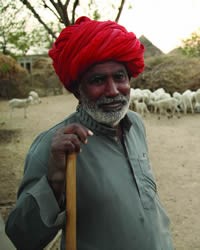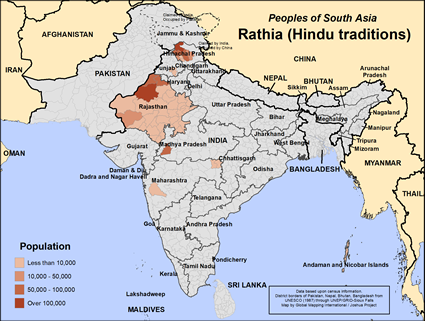The Rathia people believe that their origins are from Rathor, a Rajput clan. Though most of the Rathia people live in India's states of Rajasthan or Himachal Pradesh, there are a small number who live in Pakistan.
The Rathia people earn their living by farming, raising sheep or weaving woolen goods. Marriages among the Rathia are arranged, and families will negotiate an acceptable exchange before agreeing to the wedding. If his first wife does not give him a child, a Rathia man is permitted to marry a second woman. Since the Rathia are among the Rajput clans, they do not want to lose their high status by marrying outside their community. The Rathia people live in extended families. The Rathi are non-vegetarian, and their staple cereals are maize, wheat and rice. Consumption of alcohol is common among the men.
The Rathia people practice Hinduism. Hinduism is a catch-all phrase for the local religions of South Asia, so it is very diverse. At the popular level, Hindus worship and serve the gods of the Hindu pantheon. They visit Hindu temples and offer prayers, food, flowers, and incense to their gods in hopes of gaining protection and benefits. They do not have a personal or familial relationship with their gods like Christians or Jews. There are other Hindus who are much more philosophical, especially among the Brahmins. Almost all Hindus participate in yearly celebrations like Holi, the festival of colors and the start of spring / Diwali, the festival of lights / Navratri, the celebration of autumn / and Rama Navami, Rama's birthday.
The Rathia people need to know that their worth is tied in with their relationship with the Almighty Father.
Pray for God to send workers to point the Rathia people to the One who offers life to the full. Pray for Rathi men to be freed from alcohol addiction. Pray for a movement to Christ among the Hindu Rathia people this decade.
Scripture Prayers for the Rathia (Hindu traditions) in Pakistan.
| Profile Source: Joshua Project |











